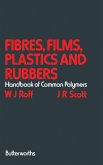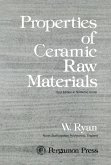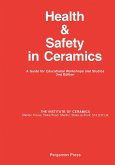Organized into 15 chapters, this book begins with an overview of the features of the instruments and of the methods employing them that are appropriate to their use in ceramic research and control laboratories. This text then book surveys the foundation of past experience with the microscope in the several ceramic fields of whitewares, refractories, porcelain enamels, cements, abrasives, foundry sands, and metallurgical slags as a basis for engineering applications and fundamental studies. Other chapters consider the nomenclature employed and interference figures. This book discusses as well the raw materials of ceramics. The final chapter deals with commercially used natural abrasives.
This book is a valuable resource for chemists, physicist, and mineralogists.
Dieser Download kann aus rechtlichen Gründen nur mit Rechnungsadresse in A, B, BG, CY, CZ, D, DK, EW, E, FIN, F, GR, HR, H, IRL, I, LT, L, LR, M, NL, PL, P, R, S, SLO, SK ausgeliefert werden.









